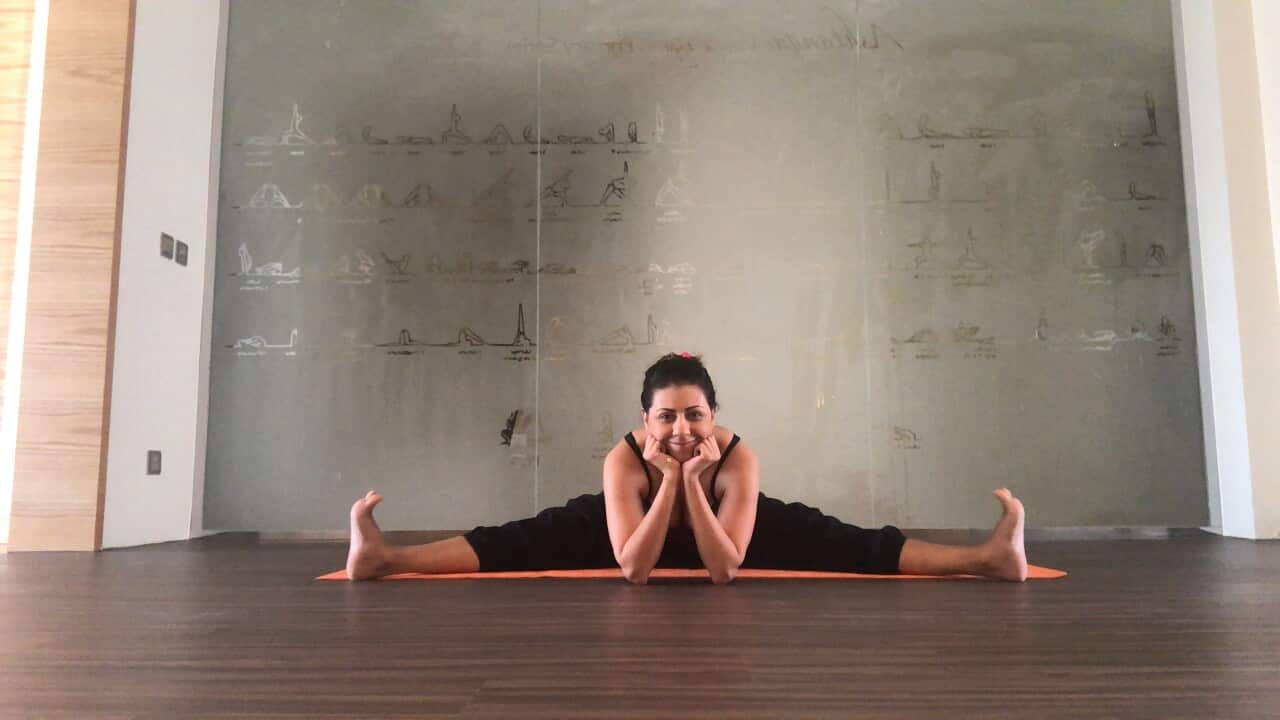Key Points
- Zainab Jawadi started practising yoga through a free course designed for refugee women
- Yoga can become one of the treatments for those experiencing chronic diseases
- Ms Jawadi has since gone on to become a yoga instructor for refugee women
This story is part of the SBS health and wellbeing initiative Mind Your Health. Click to visit the portal, featuring digital stories, podcasts and videos in English and multiple languages.
When Zainab Jawadi arrived in Australia in 2013, she says she was experiencing trauma after surviving three wars in her native Iraq.
When family problems compounded her feelings of stress, Ms Jawadi says she turned to an activity that was completely new to her and noticed her psychological condition improved significantly as a result.
She says she started practising yoga through a free course designed for refugee women and this has greatly improved her condition.
“I felt a clear difference after each session. My back pain started to fade little by little and my psychological condition improved as I was suffering from depression,” Ms Jawadi says.
According to the , yoga has physical and mental health benefits for people of all ages and can become part of of treating those who suffer from chronic diseases and is likely to speed up recovery.
In addition, the National Institutions of Health (NIH) in the United States says scientific evidence shows that yoga helps with stress control, mental health, mindfulness, healthy eating, weight loss and good sleep.

زينب جوادي تقوم بتعليم اليوجا. Source: Supplied / Supplied by Zainab Jawadi
“I applied for the STARTTS grant in 2019 and succeeded in obtaining it. The scholarship provided me with 200 hours of study free of charge, enabling me to become a teacher and not just a trainer,” Ms Jawadi says.
STARTTS is a specialised, non-profit organisation founded in 1988. It provides treatment and psychological support to help people and communities heal from the effects of trauma and rebuild their lives in Australia.
Ms Jawadi says that she faced some challenges during her studies as she was taking her steps in an area that was unfamiliar to her as an immigrant.
"I was the only one coming from Western Sydney and the course was taught in the upmarket Mosman area,” she says.
The presence of Ms Jawadi, who was wearing a hijab and leaving the venue to pray frequently, raised some questions from other participants.
One participant came to me and told me that she found it difficult to teach some Muslim immigrants who told her that yoga was a Buddhist practice.
“I explained my understanding is that, as Muslims, we can benefit from other cultures as long as this does not affect us negatively.”
The philosophy of yoga dates back to ancient Indian traditions and is believed to help the mind and body communicate with each other more effectively.
In recent years, however, yoga has grown in popularity worldwide, helping many relax amid fast and busy lifestyles.
Mr Jawadi talks about the therapeutic effects of yoga and its similarity to physical therapy or what is known as physiotherapy.
“Yoga has a therapeutic effect that some people may not know about. Postures are similar to physical therapy, but in yoga we focus more on breathing,” she says.

تقول زينب جوادي إن اليوجا تقوم بالتركيز على التنفس. Source: Supplied / Supplied by Zainab Jawadi
“I wanted to help others overcome their psychological and physical pain, especially refugee women," she says.
She has since taught groups from several cultural backgrounds, including Iraqi whose members have suffered from experiencing conflicts and conditions of instability.

Credit: Harvard Health Publishing
“Some believe that yoga is just that famous movement in which a person squats and puts his palms under his chin. But there are a lot of other poses," she laughs.
Ms Jawadi says she believes such misconceptions among some Arab Australians will change with practice.





